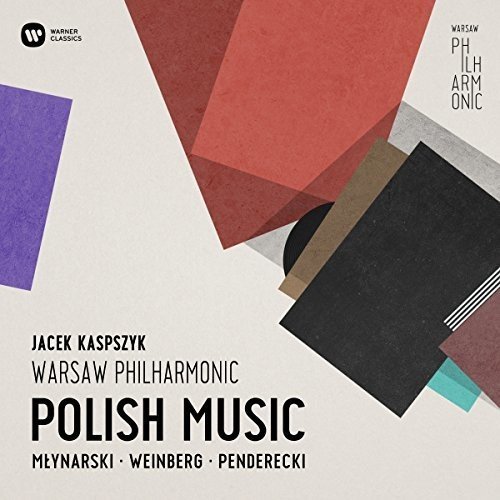Polish Music (Kaspszyk)
View record and artist detailsRecord and Artist Details
Composer or Director: Mieczyslaw Weinberg, Krzysztof Penderecki, Emil Mlynarski
Genre:
Orchestral
Label: Warner Classics
Magazine Review Date: 08/2018
Media Format: CD or Download
Media Runtime: 63
Mastering:
DDD
Catalogue Number: 19029 56997-8

Tracks:
| Composition | Artist Credit |
|---|---|
| Symphony in F, 'Polonia' |
Emil Mlynarski, Composer
Emil Mlynarski, Composer Jacek Kaspszyk, Conductor Warsaw Philharmonic Orchestra |
| Polonaise |
Krzysztof Penderecki, Composer
Jacek Kaspszyk, Conductor Krzysztof Penderecki, Composer Warsaw Philharmonic Orchestra |
| Polish Melodies |
Mieczyslaw Weinberg, Composer
Jacek Kaspszyk, Conductor Mieczyslaw Weinberg, Composer Warsaw Philharmonic Orchestra |
Author: Guy Rickards
Mynarski (1870-1935) was a composition pupil of Rimsky-Korsakov and it shows, most particularly in the sparkling Presto scherzo which, in the composer’s programme, symbolises hope for Poland’s release from partition and foreign domination, eloquently depicted in the preceding Adagio. Poland’s past and hopes for the future are the themes of the outer movements, the music shot through with the flavour and rhythms of Polish dances, such as the oberek and cracovienne. Written in a late-Romantic style, this is an attractive score, played with compelling fervour.
The couplings are lighter but no less nationalistic in tone. Penderecki’s 2015 Polonaise is not so much a setting of the dance as a tone poem on the idea of it. An appealing concert-opener, I doubt anyone listening with an innocent ear would guess Penderecki as its creator. Weinberg’s Polish Melodies (1950) are more individual, written at a time of personal danger having fallen foul of the Soviet regime. The orchestration in the first dance reminded me a little of Nielsen, curiously; elsewhere there are touches of Shostakovich (in lighter, raucous vein). The four dances make an endearing and appealing set that at times looks into the abyss but turns away. Excellent performances, fine sound.
Discover the world's largest classical music catalogue with Presto Music.

Gramophone Digital Club
- Digital Edition
- Digital Archive
- Reviews Database
- Full website access
From £8.75 / month
Subscribe
Gramophone Full Club
- Print Edition
- Digital Edition
- Digital Archive
- Reviews Database
- Full website access
From £11.00 / month
Subscribe
If you are a library, university or other organisation that would be interested in an institutional subscription to Gramophone please click here for further information.




